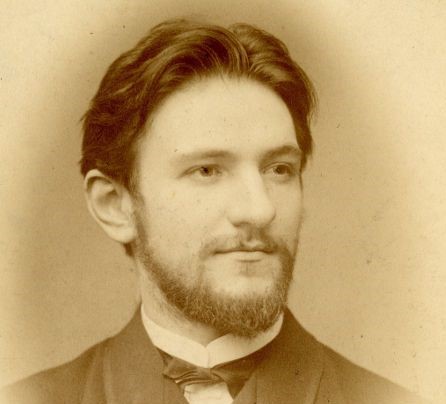 Foerster (1859–1951), a contemporary of Janáček, does not share his fame outside of the Czech Republic. His long life encompassed everything from the pomp and waltzes of Franz Josef’s Rakousko-Uhersko Empire to the beginnings of the Communist regime. He was a close friend of Mahler and of Tchaikovsky. His oeuvre includes five symphonies and five operas, as well as liturgical and chamber music. You can hear some samples of his work in a brief article on the Radio Prague website. Like his friend Mahler, Foerster’s life was haunted by the deaths of friends, family, and a child. He sought solace in his Catholic faith, and was instrumental in reviving the old Slavonic mass.
Foerster (1859–1951), a contemporary of Janáček, does not share his fame outside of the Czech Republic. His long life encompassed everything from the pomp and waltzes of Franz Josef’s Rakousko-Uhersko Empire to the beginnings of the Communist regime. He was a close friend of Mahler and of Tchaikovsky. His oeuvre includes five symphonies and five operas, as well as liturgical and chamber music. You can hear some samples of his work in a brief article on the Radio Prague website. Like his friend Mahler, Foerster’s life was haunted by the deaths of friends, family, and a child. He sought solace in his Catholic faith, and was instrumental in reviving the old Slavonic mass.
All I have to represent him, in my collection, is his Fourth Symphony in C minor, Op.54, subtitled “Easter”. It certainly shows a mastery of the orchestra. His influences are obvious, and in a curiously chronological sequence. The first movement sounds like Schubert, the two middle ones are very Dvořák, and the last one distinctly Mahleresque. But the symphony is no mere pastiche or imitation. The rich polyphonic texture is etched out with a small orchestra, each instrument given a clear and distinct role. It is deeply emotional music, drifting effortlessly between lyrical nostalgia and tragedy. All these qualities are hallmarks of Czech music, and it is remarkable to me that he remains obscure in the English-speaking world.
Addendum, added June 14, 2007: While in Prague, I picked up a vinyl of two piano trios by Foerster, one in F Minor, Op.8, and one in B, Op.38. They are fine pieces, and confirm my impression that he deserves more serious listening outside of his homeland. Both of the trios have very delicate feelings, and fine melodies, though the later one is noticeably more melancholy. Has any compose ever gotten more cheerful with age? Perhaps Ralph Vaughan Williams.
0 Comments.